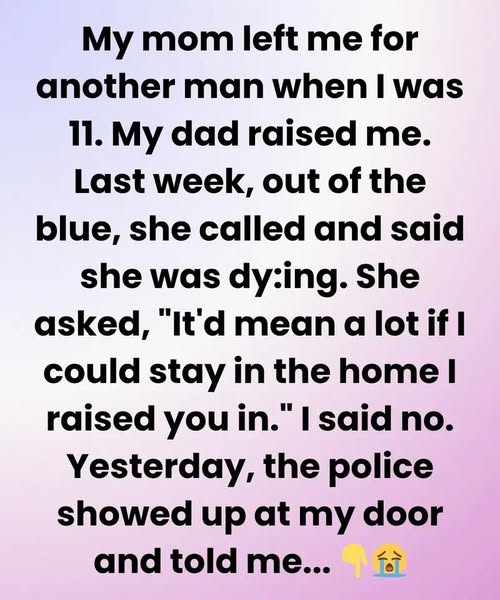The cops came to my door and asked if I wanted them to move her along.
“She’s been parked down the street for hours,” the officer said. “Says this is her only home and she just wants to see you.”
I stood there with my hand on the frame, feeling twelve again. My mom left when I was eleven—two lines on a note and a man named Victor—and my dad raised me like the sun rose and set on keeping me okay. He never bad-mouthed her. He just made dinner, worked two jobs, sat through every school play, and pretended not to notice when I watched the front window at night.
“Give me a minute,” I told the officer.
The next morning I found her perched on the hood of a faded sedan, thinner, grayer, smaller. She coughed, smiled like it hurt.
“Mateo,” she said. “You look just like your father.”
Hearing his name in her mouth made my chest close. She told me she was dying. Months, maybe. Victor had died years ago. No family would take her. She wanted to spend her last days in “the house I raised you in.”
I almost laughed. She hadn’t paid a single mortgage payment after she left. It wasn’t her house anymore. It was my dad’s and mine, brick by brick, shift by shift.
I told her no. Then I bought her a week in a hotel because I couldn’t make myself leave her in a car. She promised she’d “earn back” my trust. I didn’t say the quiet part: some debts don’t have payment plans.
Still, she called. For rides to chemo. For tea. Sometimes because the night felt like it was swallowing her. I kept my distance until distance felt cruel. Her hands shook on a Styrofoam cup. Once, in the car, she asked if I hated her.
“I don’t know,” I said. “Hate takes energy. I got tired.”
She nodded. “Your father was the best man I ever knew. I destroyed the one thing that mattered most. I’ll never forgive myself.”
It landed like a stone in a still pond. She’d never said anything like that before.
Two weeks later a letter from a lawyer detonated my careful detachment. Victor had left her buried in debt. Years back, while she and Dad were still legally married, she’d forged his signature on paperwork to put our house in her name. It had never been fully unwound. Now collectors were circling, and on paper—on some stupid technicality—my home could be at risk.
I showed up at the hospital shaking. She cried before I spoke.
“I was trying to fix it,” she said. “I told the lawyer to transfer everything back. I didn’t want you to know unless it worked.”
All the air felt thin. She had left me once. Now she might have taken the last thing my dad and I built. And still—still—I wanted to believe that this time she was telling the truth.
Days blurred into phone trees, hold music, paperwork that made my eyes ache. Then she asked me to meet her outside the hospital entrance.
She pressed an envelope and a key into my hand. “This explains,” she said. “And the key—it’s to a safety deposit box Victor never knew about. For you. For your father’s memory.”
I didn’t trust her. I opened the letter anyway. In shaky handwriting she confessed to leaving, to the forgery, to saving scrap by scrap for years—cash tips, hidden bonds—“for you, for when I could give something back.”
I went to the bank expecting dust and lies.
Inside the box: $42,000 in rubber-banded cash. Old savings bonds. Another note. “I’m sorry again.”
Something in me cracked open. I paid off the debt. I fortified the deed. I stood alone in the bank lobby with tears running hot and stupid down my face because—finally—she had done one right thing.
I drove straight to the hospital to tell her.
“She passed this morning,” the nurse said gently.
I sat in my car and cried like grief had just been waiting for a door. Not just for her. For the words I wouldn’t get to say. For the little boy at the window. For my dad, who never asked for anything but would have asked me to be kind.
I buried her next to him. Maybe he’d roll in his grave. Or maybe the man who packed my lunches and taught me to change a tire would say, Let it end with grace.
Weeks later I walked the rooms of the house we kept—running my palm along the hall where my height marks still faintly showed, the photo of Dad with a baby version of me, the dent in the doorframe from a teenage temper. The anger I’d been carrying for years had turned to something else. Not absolution. Not a clean slate. Just… lighter.
Here’s what I know now: forgiveness isn’t saying it was okay. It’s putting down a weight that was never helping you carry anything. My mom made choices that splintered us. At the end, she made one that held.
I kept the house. I kept my father’s steadiness. And I let the rest go.
If you’re standing where I stood—hurt, protective, exhausted—don’t let bitterness be the last thing you inherit. Sometimes closure shows up in a crooked envelope with a key inside. Sometimes it doesn’t. Either way, choosing peace is yours.


